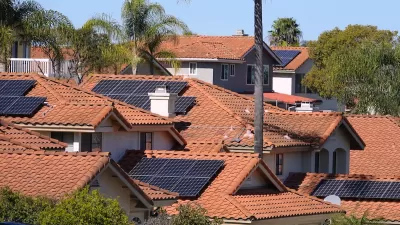The Florida Legislature has delivered a bill to Gov. Rick Scott's desk that would end property taxes on solar panels in the state of Florida for all commercial and industrial uses.

"A bill to implement the constitutional amendment designed to expand the use of solar- and other renewable-energy devices is ready to go to Gov. Rick Scott," reports the News Service of Florida in an article published by the Palm Beach Post.
The legislation implements an amendment approved by 72.6 percent of voters last August, to extend a renewable energy tax break to commercial and industrial properties. The state already has a similar tax break for residential properties.
According to a follow up post for Construction Dive by Robert Walton, the legislation eliminates property taxes on the solar panels. The solar industry has strong support from the public in the Sunshine State, writes Walton.
Solar growth is increasingly seen by Florida residents as a way to expand clean energy jobs in the state. According to data from The Solar Foundation [pdf], Florida saw solar employment gain 1,700 positions last year, growth of about 25%. The state's solar industry now employs more than 8,200 people.
Walton also notes that the vote that enabled the property tax break was much less controversial than Amendment 1, another solar measure that appeared on the statewide ballot that failed to pass. Planetizen Correspondent Irvin Dawid provided a post-mortem on Amendment 1 after the election.
FULL STORY: Florida lawmakers send solar tax-break implementation to Gov. Scott

Planetizen Federal Action Tracker
A weekly monitor of how Trump’s orders and actions are impacting planners and planning in America.

San Francisco's School District Spent $105M To Build Affordable Housing for Teachers — And That's Just the Beginning
SFUSD joins a growing list of school districts using their land holdings to address housing affordability challenges faced by their own employees.

The Tiny, Adorable $7,000 Car Turning Japan Onto EVs
The single seat Mibot charges from a regular plug as quickly as an iPad, and is about half the price of an average EV.

Seattle's Plan for Adopting Driverless Cars
Equity, safety, accessibility and affordability are front of mind as the city prepares for robotaxis and other autonomous vehicles.

As Trump Phases Out FEMA, Is It Time to Flee the Floodplains?
With less federal funding available for disaster relief efforts, the need to relocate at-risk communities is more urgent than ever.

With Protected Lanes, 460% More People Commute by Bike
For those needing more ammo, more data proving what we already knew is here.
Urban Design for Planners 1: Software Tools
This six-course series explores essential urban design concepts using open source software and equips planners with the tools they need to participate fully in the urban design process.
Planning for Universal Design
Learn the tools for implementing Universal Design in planning regulations.
Smith Gee Studio
City of Charlotte
City of Camden Redevelopment Agency
City of Astoria
Transportation Research & Education Center (TREC) at Portland State University
US High Speed Rail Association
City of Camden Redevelopment Agency
Municipality of Princeton (NJ)





























